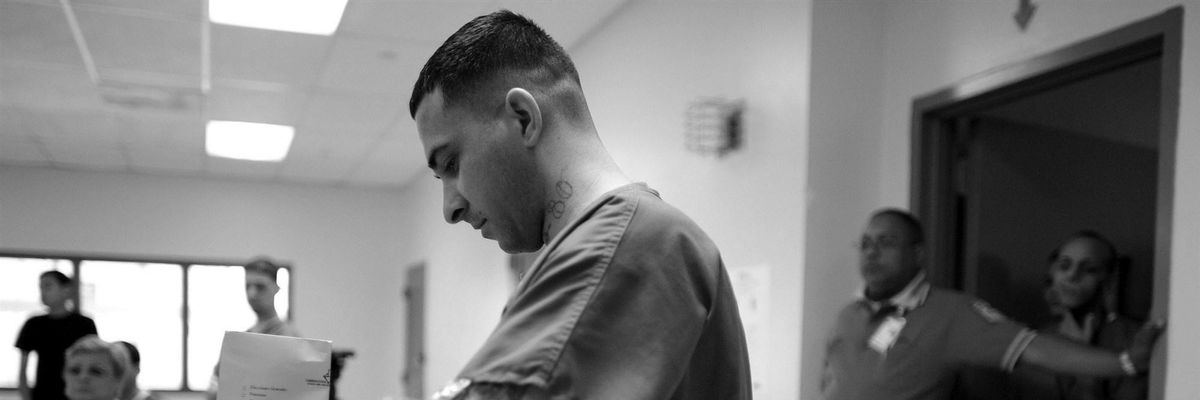Bernie Sanders' suggestion that all states should allow incarcerated people to vote, instead of re-enfranchising them one-by-one after incarceration, is a constructive way of bypassing the voting rights debate and getting right down to the idea that one remains a citizen even after being convicted of a crime. (Elizabeth Warren wasn't opposed to the idea a week before.)
Disenfranchising people is a form of "civil death" -- stripping live people of civil rights, almost as if they had died, just because they've been convicted of a crime. Certain rights have been restored in some states for prisoners, making their conditions more like a civil vegetative state; the right to marry, the right to free speech, the right to access the court and the right to religious freedom have been granted, sometimes under court order and occasionally with exceptions. The most basic right in a democracy though -- and the one that could bring them back to civil life-- is the right to vote, and it remains elusive for prisoners in 48 states (as well as for many formerly incarcerated people in 35 states).
Currently, only two states - Vermont and Maine - allow prisoners to vote from behind bars, regardless of their conviction status. But Utah allowed it until 1998 and Massachusetts prisoners could vote until 2000, when the state rescinded that right after a few of them formed a PAC and stated their intention to both vote and influence local elections. In other words, the disenfranchisement of people upon conviction is hardly a universal or required practice.
And, the U.S. Census Bureau already counts inmates as potential voters in the districts in which their prisons stand (though not in their hometowns), even when they can't vote. This practice of prison gerrymandering has attracted some attention recently because, as advocates like the Prison Policy Initiative have argued, it violates the "one person-one vote" rule by artificially expanding the populations of prison-adjacent towns where prisoners won't live after release, and thus artificially undercounting their home districts.
Those who argue against felony re-enfranchisement and in-prison voting often rely on the theory that a prison constituency would automatically be a Democratic constituency. That's not necessarily the case: The prisoner who started the PAC in Massachusetts used his vote, while he had it, to help elect President George W. Bush, and inmates in Puerto Rico -- 6,195 of them -- voted in 2016's Republican primary (constituting one-sixth of the voters).
Allowing people in prison to vote and enter national political conversations might be the best way to eliminate the enduring, expensive problem of dangerous prison conditions.
But perhaps more importantly than the fairness argument is that allowing people in prison to vote and enter national political conversations might be the best way to eliminate the enduring, expensive problem of dangerous prison conditions. That inmates have so little political power has allowed them to be victimized and killed in poorly managed facilities with virtually no political repercussions for those who have designed, funded and essentially administered the current system.
But if candidates have to vie for prisoners' votes will humanize them, they'll also have figure them into lawmaking considerations.
This is -- or at least should be -- of vital consideration to both those invested in prison conditions and anyone with a conscience. Just last week, the Department of Justice delivered a report summarizing a two-year investigation into Alabama prisons that concluded that conditions there are so severe and dangerous that they violate the Eighth Amendment guarantee against cruel and unusual punishment. In the report's preface, investigators describe five stabbings, six beatings and four sexual assaults that happened in Alabama prisons in just one week in September 2017. The rest of the report recounts more knifings, rapes and inmates being tied up for days without anyone noticing. This is just the substantiated accounts from prison records; there's likely more violence that hasn't been reported.
It's not just Alabama. Prisoners lose their lives to abuse and neglect around the country. When violence claimed the life of noted mobster Whitey Bulger at the federal penitentiary in Hazelton, Pennsylvania, it was the third murder in six months at that facility. Seven men were stabbed to death during the April 2018 riot at Lee Correctional Institution in South Carolina. In Texas, 23 people have lost their lives to extreme heat in uncooled prisons since 1998. And, when natural disasters strike a prison, inmates may be left out of evacuation efforts entirely.
Underfunding, ultimately, caused all of these deaths; no one wanted to pay for air conditioning in Texas, and violence explodes into cracks in prison staffing because correction officer vacancies are reaching untenable levels in many states. Saving their lives isn't a question of ability; it's a question of priority.
Elected officials are the people who can solve these problems. And if this level of regular violence and death beset almost any other population -- and certainly a majority white population -- politicians would have spent money to stop it already. But, in part because incarcerated people lack political power, many politicians have deemed them expendable.
Perhaps no one lives more subject to the laws of the United States than the American prisoner, and yet he or she has no say in them. Allowing him or her to vote is how we end the dehumanization of incarcerated citizens. Not only will investment of rights resurrect them civilly, prisoners' participation will ultimately affect policy for the better and make our prisons more humane.



